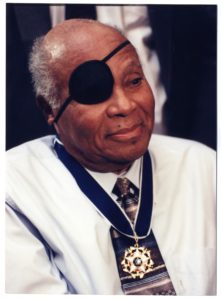The University of Mary Washington Board of Visitors has voted to change the name of Trinkle Hall to James Farmer Hall. “I commend the action of the Board,” said Rector Heather Crislip. “We are talking about one of the most beautiful and iconic buildings on campus, and its name should reflect our community and our values.”

The vote to change the name of this building comes at a pivotal time in our nation’s history. The action was precipitated by the exhaustive work of UMW’s Campus Environment Presidential Ad Hoc Committee. That group was charged in 2017 with evaluating campus art, monuments, and other representations of the University’s history and community in order to ensure that Mary Washington is a welcoming environment for all.
In its subsequent 74-page report presented to the Board in November 2019, the committee’s research revealed that certain works of art and artifacts present a one-dimensional interpretation of UMW’s history. The Board unanimously voted to endorse all 17 of the committee’s recommendations for addressing the issues, with the greatest urgency placed upon identifying a new name for Trinkle Hall, named for a former governor of Virginia who was an active proponent of eugenics and segregation. The board further directed that the new name provide an opportunity for celebration, positive growth, and affirmative identity of the campus.
Earlier this year, a Naming Committee of UMW alumni, faculty, staff, and students solicited nominations for consideration. The committee then narrowed the field by tallying the top five nominees, surveyed the community regarding these nominees, and conveyed the results to President Troy Paino, who voiced his support of the committee’s recommendation to the Board.
With the COVID-19 pandemic curtailing the Board’s activities for several months, this meeting was the first opportunity for the Board to take action.
Dr. James L. Farmer Jr., one of the “Big Six” leaders of the civil rights movement, spent his final years as a professor of history at Mary Washington. Born in 1920 in Marshall, Texas, into a family of educators, the young Farmer “swelled with rebellion” when he personally witnessed the injustices of Jim Crow, igniting his lifelong social justice activism. In 1942, at age 22, Farmer co-founded the Congress of Racial Equality (CORE), which organized several protests of segregated facilities in the 1940s and 1950s.
CORE, under Farmer’s leadership, led the 1961 Freedom Rides into several southern states, including Virginia, in a nonviolent test of Supreme Court rulings that outlawed segregation in interstate transportation and bus terminals. Farmer, along with Dr. Martin Luther King Jr., of the Southern Christian Leadership Conference (SCLC); John Lewis of the Student Nonviolent Coordinating Committee (SNCC); and others organized the 1963 March on Washington.
In the 1980s, Farmer moved to Spotsylvania County and taught at Mary Washington College. Scores of alumni have vivid and fond memories of the lessons they learned from the man who possessed a booming voice and a treasure trove of life experiences. His teaching tenure was from 1985 to 1998, the same year Farmer was presented the Presidential Medal of Freedom. He died in July of 1999.
The University memorialized Dr. Farmer with a bust outside what was formerly known as Trinkle Hall. In commemoration this year of the 100th anniversary of his birth, Mary Washington formed a James Farmer Legacy committee, of which the late Rep. John Lewis served as honorary chair.
The values of Trinkle Hall’s namesake stood in stark contrast to those of James Farmer. Elbert Lee Trinkle served as governor of Virginia from 1922 to 1926. While many of Trinkle’s accomplishments were laudable, he is perhaps best known for championing three controversial pieces of legislation: the Racial Integrity Act of 1924, the Forced Sterilization Act of 1924, and the Racial Segregation Act of 1926.
The former Trinkle Hall, now known as James Farmer Hall, in the center of the Fredericksburg campus, was built in 1940 as the college’s library. When Simpson Library opened in 1989, Trinkle was repurposed into classrooms. Today, the building houses the Department of Classics, Philosophy, Religion; the Department of Mathematics; the Department of Computer Science; and the College of Education’s Fredericksburg campus class


















